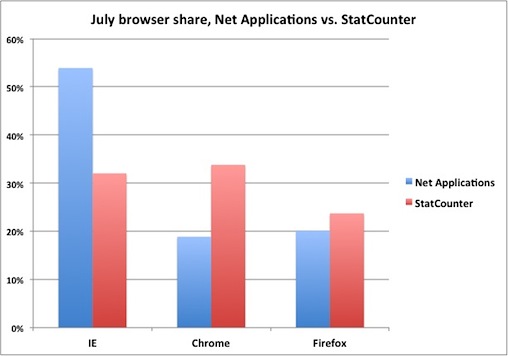Google's Chrome browser lost usage share for the fifth time in the last seven months, while Mozilla's Firefox gained share for the second consecutive month, a Web measurement company said Wednesday.
Net Applications, which calculates browser usage by tracking unique visitors to approximately 40,000 Web sites, pegged Chrome's share for July at 18.9%, a two-tenths of a percentage point decline from June. Chrome has been in decline this year: Of the six months in which Chrome went into the red since Net Applications began tracking the browser, five were in 2012.
Firefox's share grew by one-tenth of a point to end the month at 20.2%, Net Applications declared. The open-source browser is up nearly half a point since its four-year low of 19.7% in May 2012.
But Net Applications' numbers were again disputed by rival StatCounter, which tallies browser share differently, counting page views, not unique visitors, for about 3 million websites. And unlike Net Applications, StatCounter does not weight the results by each country's pool of online users.
The Irish analytics company said Chrome's share climbed 1.1 points to 33.8%, and that Firefox fell eight-tenths of a percentage point to 23.7%.
And while both companies agreed that Microsoft's Internet Explorer (IE) relinquished share and that Apple's Safari gained ground, they clashed when it came to the numbers. StatCounter said IE lost more, and Safari gained more, than did Net Applications.
Their estimates for IE were simply irreconcilable. Net Applications said IE had a July share of 53.9%, but StatCounter pegged the browser at 32%, a 21.9 point difference. The gap between their July results was larger than the month before.
Chrome's share, too, was in dispute, with StatCounter's figure 14.9 points higher than Net Applications' assessment. That disparity was also greater than June's results.
The companies' diverging data triggered an argument several weeks ago about which delivers the more accurate estimate, especially for IE and Chrome, where their differences are starkest. In June, each defended their methodology even as Google's top Chrome executive claimed his browser was the planet's most popular.
Not surprisingly, the companies disagreed on nearly everything, including how the four supported editions of IE split Microsoft's share, and how effectively Firefox's silent update process had pushed users to the newest version.
Net Applications, for example, said IE8 accounted for 49.4% of all copies of IE used during July, and was the most-used edition of any browser. StatCounter put the 2009 application's share of all Microsoft browsers at 41.4%, low enough to fall to second place behind the newer IE9.
They could also not agree on whether Firefox 14 had been widely adopted.
Net Applications said Firefox 14's 2.9% overall share for July represented 4% of all copies of Mozilla's browser, indicating that the nearly-silent, background update mechanism that debuted in April had failed to boost Firefox 14's uptake.
That contradicted StatCounter, which last month tracked a very rapid transition to Firefox 14: The Irish metrics company said that edition accounted for 22.2% of all copies of Firefox for the month.

The disparity between the two major metrics firms' browser share estimates grew in July.



